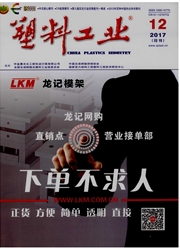

 中文摘要:
中文摘要:
木薯渣作为一种生物质废弃物,其主要成分为淀粉和纤维素,具有良好的生物降解性,可与生物可降解的聚合物进行共混制备全降解复合材料.将木薯渣与聚丁二酸丁二醇酯(PBS)在密炼机中进行共混,制备出木薯渣/聚丁二酸丁二醇酯全降解复合材料,并研究木薯渣含量对复合材料的拉伸、弯曲、冲击力学性能的影响.结果表明,复合材料的拉伸强度、拉伸模量、断裂伸长率、弯曲强度都较纯PBS的低,随着木薯渣含量的增大而降低;木薯渣质量分数为10%的复合材料的弯曲模量较PBS的高,随后随着木薯渣含量的增大而降低;随着木薯渣含量的增加,复合材料的冲击强度先减小后增大最后减小,其在木薯渣质量分数为20%时出现一个最大值,但较PBS的冲击强度低.
 英文摘要:
英文摘要:
Cassava residue was one of biomass wastes and had excellent biodegradation,its main components were starches and celluloses.It can be blended with other biodegradable polymers to prepare the novel composites.In this study,cassava residue was blended with poly butylene succinate in the internal mixer to produce the biodegradable composite.Furthermore,the effect of cassava residue content on mechanical properties were studied such as the tensile,flexural,and impact properties.The tensile strength,tensile modulus,elongation at break,and flexural strength of the composites were lower than those of pure PBS,and decreased gradually as the cassava residue loading increased.The flexural strength of the composites reduced gradually with the increase in cassava residue loading,which was higher than that of pure PBS when the cassava residue loading was 10 wt%.Compared with pure PBS,the composites exhibited lower impact strength; the impact strength of the composites increased at first and then decreased as the cassava residue loading increased,and arrived a maximum when the cassava residue loading was 10 wt%.
 同期刊论文项目
同期刊论文项目
 同项目期刊论文
同项目期刊论文
 期刊信息
期刊信息
